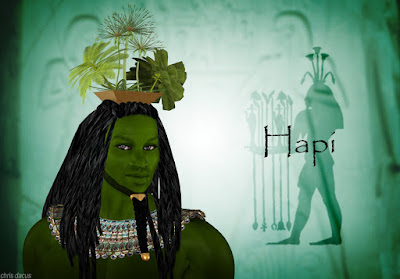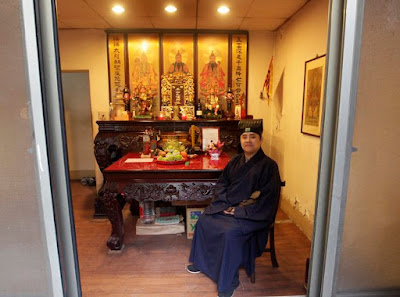THE TALE OF THE TWO PRIESTS OF ANTINOUS
(From THE MEMOIRS OF AN ANCIENT PRIEST OF ANTINOUS by Ernest Gill)
TWO PRIESTS of Antinous at the Temple of the Blessed Boy in Rome had devoted their lives to the Good God and were getting on in years.
As young men they had become priests together.
Their love for each other was symbolized and enhanced by their love for Antinous. Together, they had lived out their lives at the great Temple of Rome under the most exalted Priest Nikias.
Nikias of Rome was the author of a famous inscription in Greek which addresses Antinous as NEOS HERMES the "New Hermes" who conveys the deceased through the portals of death into transcendent light. A great Antinoo-Hermeticist, Nikias had taught them much about the triumph of Antinous over death.
And now, as toothless old men, they were approaching the final stage of their earthly priesthood. Both men were frail and ill. They knew death was imminent.
But they were unafraid, for they were confident that they would be re-united in death through the grace and love of the Most Great and Good God whom they had served so faithfully all their lives.
But how exactly would that re-union occur? The ancient texts spoke of the Barque of Millions of Years sailing across the heavens towards the Star of Antinous. But that was the Egyptian imagery, and these priests were both Romans and had only ever served in the Antinous Temple of Rome.
The Rome Temple would of course place their death masks in niches in a special area of the temple dedicated to former priests.
Incense and prayers would be offered to them. Would their shades inhabit those niches?
Would Antinous welcome them in Hades, despite the fact that Antinous the Boy God had come from Bithynia in Asia Minor?
Would their souls be reincarnated as some Eastern mystics believed? Would they hover between heaven and Earth or perhaps be consigned to spending part of the year in the underworld and part of it as lemurs roaming the Earth?
They weren't afraid. But they were exceedingly curious to find out. Confidentially, they believed amongst themselves that they would sail with Antinous aboard the Boat of Millions of Years — a perpetual journey which would never end. But they weren't sure ....
They had spent years perfecting their meditation skills and, without false modesty, they could claim to be masters at the art of trance vision travel. They both knew that the Egyptian hieroglyphs had told the truth in promising that Antinous speaks through dreams and visions. They also knew how to send psychic messages to each other, and had done so on many occasions.
So they made a deal. He who was the first to die would appear to the other in a dream and reveal what the afterlife was like.
As accomplished as they were, they nonetheless knew that such astral communication must be as succinct and simple as possible.
So they agreed that, if the afterlife was as they had envisioned it, the deceased would appear to his friend and utter the word TALITER meaning "exactly so" as they had expected it to be.
And if it was not as they had imagined, the deceased would say ALITER meaning "different" from what they had expected.
The fateful day came not long afterward, and the surviving priest lit incense and recited prayers before the niche mask of his beloved friend and fellow priest.
That night, almost immediately after his head touched his pillow, his deceased friend appeared to him. He was no longer old and sick and frail. He was as young and handsome as the day they had entered the temple. And he was smiling and clearly very excited and seemed to have forgotten the agreed-upon words.
"Taliter or aliter, which is it?" the sleeping priest asked his departed friend.
The friend smiled bigger than ever and said: TOTALITER ALITER — "totally different" — and still beaming with joy, he turned and vanished into golden light.






























%2Bby%2BJacopo%2BVignali.jpg)


